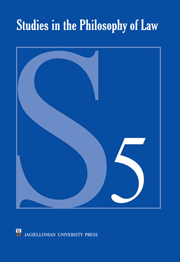Book contents
- Frontmatter
- Contents
- Preface
- I Legal Implications of Medical Advances
- II Evolutionary Approach to the Normativity of Law
- 5 Some Remarks on the Naturalization of Law
- 6 Revisiting ‘Equality in Exchange Revisited’: Contemporary Evolutionary (Genetic and Cultural) Approaches to Human Behaviour and the Normativity of Law
- 7 Legal Positivism and Evolutionary Psychology: Can Legal Positivists Learn Something from Darwin?
- 8 Neurolaw. A New Paradigm in Legal Philosophy
- 9 The Question of Non Human Primates Morality
- 10 Animals as Moral Agents
- III Appendix
- About the Authors
6 - Revisiting ‘Equality in Exchange Revisited’: Contemporary Evolutionary (Genetic and Cultural) Approaches to Human Behaviour and the Normativity of Law
from II - Evolutionary Approach to the Normativity of Law
Published online by Cambridge University Press: 05 September 2014
- Frontmatter
- Contents
- Preface
- I Legal Implications of Medical Advances
- II Evolutionary Approach to the Normativity of Law
- 5 Some Remarks on the Naturalization of Law
- 6 Revisiting ‘Equality in Exchange Revisited’: Contemporary Evolutionary (Genetic and Cultural) Approaches to Human Behaviour and the Normativity of Law
- 7 Legal Positivism and Evolutionary Psychology: Can Legal Positivists Learn Something from Darwin?
- 8 Neurolaw. A New Paradigm in Legal Philosophy
- 9 The Question of Non Human Primates Morality
- 10 Animals as Moral Agents
- III Appendix
- About the Authors
Summary
Introduction
When it was originally written, the goal of this chapter was to construct a small part of what has been called a bio-legal history of contractual promises and their laws. However, such an enterprise necessarily entails prior reflection on how best to go about such an attempt to construct these bio-legal histories. Indeed, I mainly hoped, and still do, to show why evolutionary analysis in law, as well as its legal philosophical counterparts, could benefit considerably from incorporating culture – and its accompanying evolutionary theory – more explicitly into its models than seems to be the case at present. This should allow me to contrast my approach with some of the views expressed in Wojciech Załuski's recent book on Evolutionary Theory and Legal Philosophy, addressing questions lying at the heart of what could become an “evolutionary current in legal philosophy.”
To this end, I will draw on the legal example of equality in exchange in contract law on the one hand and on recent research on human cooperative behaviour on the other. I will start by making some remarks on the issue of substantive fairness in legal contract theory and in legal anthropology (Section II). I will then briefly sketch some results of experiments commonly used in behavioural economics to shed light on human pro-social behaviour (Section III).
- Type
- Chapter
- Information
- Studies in the Philosophy of LawLaw and Biology, pp. 83 - 102Publisher: Jagiellonian University PressPrint publication year: 2010

